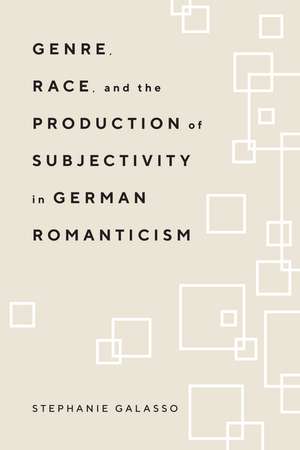Genre, Race, and the Production of Subjectivity in German Romanticism
Autor Stephanie Galassoen Limba Engleză Hardback – 15 apr 2024
Exposes German Romanticism’s entanglements of aesthetic philosophy with racialized models of humanity
Late Enlightenment philosophers and writers like Herder, Goethe, and Schiller broke with conventions of form and genre to prioritize an idealized, and racially coded, universality. Newly translated literatures from colonial contexts served as the basis for their evaluations of how to contribute to a distinctly “German” national literary tradition, one that valorized modernity and freedom and thus fortified crucial determinants of modern concepts of whiteness. Through close readings of both canonical and less-studied Romantic texts, Stephanie Galasso examines the intimately entwined histories of racialized subjectivity and aesthetic theory and shows how literary genre is both symptomatic and generative of the cultural violence that underpinned the colonial project.
Poetic expression and its generic conventions continue to exert pressure on the framing and reception of the stories that can be told about interpersonal and structural experiences of oppression. Genre, Race, and the Production of Subjectivity in German Romanticism explores how white subjectivity is guarded by symbolic and material forms of violence.
Late Enlightenment philosophers and writers like Herder, Goethe, and Schiller broke with conventions of form and genre to prioritize an idealized, and racially coded, universality. Newly translated literatures from colonial contexts served as the basis for their evaluations of how to contribute to a distinctly “German” national literary tradition, one that valorized modernity and freedom and thus fortified crucial determinants of modern concepts of whiteness. Through close readings of both canonical and less-studied Romantic texts, Stephanie Galasso examines the intimately entwined histories of racialized subjectivity and aesthetic theory and shows how literary genre is both symptomatic and generative of the cultural violence that underpinned the colonial project.
Poetic expression and its generic conventions continue to exert pressure on the framing and reception of the stories that can be told about interpersonal and structural experiences of oppression. Genre, Race, and the Production of Subjectivity in German Romanticism explores how white subjectivity is guarded by symbolic and material forms of violence.
Preț: 440.67 lei
Preț vechi: 518.44 lei
-15% Nou
Puncte Express: 661
Preț estimativ în valută:
84.32€ • 91.88$ • 71.05£
84.32€ • 91.88$ • 71.05£
Carte indisponibilă temporar
Doresc să fiu notificat când acest titlu va fi disponibil:
Se trimite...
Preluare comenzi: 021 569.72.76
Specificații
ISBN-13: 9780810146808
ISBN-10: 0810146800
Pagini: 216
Dimensiuni: 152 x 229 x 18 mm
Greutate: 0.43 kg
Editura: Northwestern University Press
Colecția Northwestern University Press
ISBN-10: 0810146800
Pagini: 216
Dimensiuni: 152 x 229 x 18 mm
Greutate: 0.43 kg
Editura: Northwestern University Press
Colecția Northwestern University Press
Notă biografică
STEPHANIE GALASSO is a visiting lecturer in German at Rutgers University.
Cuprins
Introduction
Chapter 1: Bettine von Arnim’s Impossible Vermählung
Chapter 2: Sorrow as Aesthetic Object in Herder
Chapter 3: Genre and Mourning in Karoline von Günderrode
Chapter 4: Goethe and the Genre of Law
Chapter 5: Hölderlin’s Odes and the Difficulty of Community
Coda
Notes
Works Cited
Index
Chapter 1: Bettine von Arnim’s Impossible Vermählung
Chapter 2: Sorrow as Aesthetic Object in Herder
Chapter 3: Genre and Mourning in Karoline von Günderrode
Chapter 4: Goethe and the Genre of Law
Chapter 5: Hölderlin’s Odes and the Difficulty of Community
Coda
Notes
Works Cited
Index
Recenzii
“Galasso’s book takes an important step toward a more socially just practice of eighteenth-century German studies.” —Patricia Anne Simpson, University of Nebraska–Lincoln
"Genre, Race, and the Production of Subjectivity in German Romanticism lucidly connects the racialized underpinnings of German aesthetic philosophy with the ideologically regulatory, Eurocentric forms of romantic genres. Stephanie Galasso reveals how translations from British colonial contexts—eyewitness accounts, journalistic, and literary texts —are tributaries into German romantic thought, and places women authors at the center of contemporary philosophical debates and practices around orientalism." —Catriona MacLeod, University of Chicago
"Genre, Race, and the Production of Subjectivity in German Romanticism lucidly connects the racialized underpinnings of German aesthetic philosophy with the ideologically regulatory, Eurocentric forms of romantic genres. Stephanie Galasso reveals how translations from British colonial contexts—eyewitness accounts, journalistic, and literary texts —are tributaries into German romantic thought, and places women authors at the center of contemporary philosophical debates and practices around orientalism." —Catriona MacLeod, University of Chicago
Descriere
Exposes German Romanticism’s entanglements of aesthetic philosophy with racialized models of humanity
